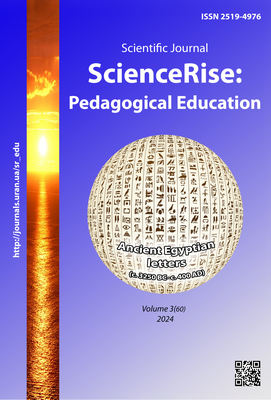Підготовка майбутніх суднових механіків та електриків засобами компетентнісного, комунікативного та інтердисциплінарного підходів
DOI:
https://doi.org/10.15587/2519-4984.2024.305117Ключові слова:
інтердисциплінарний підхід, комунікативний підхід, компетентнісний підхід, цикл підготовки, морська англійська моваАнотація
У статті розглядаються особливості підготовки майбутніх суднових механіків та електриків засобами компетентнісного, комунікативного і інтердисциплінарного підходів; акцентується увага на інтердисциплінарних зв’язках дисциплін різних циклів підготовки; наголошується, що процес навчання майбутніх моряків повинен базуватись на компетентнісному, комунікативному та інтердисциплінарному підході, що забезпечить майбутніх спеціалістів ефективністю у набутті знань, умінь та навичок.
Освітніми цілями компетентнісного підходу у дослідженні визначаються важливі компетентності, що включають у себе знання і розуміння (теоретичні знання з академічної дисципліни, здатність знати і розуміти); знання як діяти (практичне або операційне застосування знань в певних ситуаціях); знання як жити (цінності як інтегральний елемент сприйняття і співіснування з іншими в соціальному контексті).
Інтердисциплінарний підхід представляє собою міждисциплінарний рух знання до цілісності, що передбачає системне вивчення об’єкта, виступає логічним результатом змін у кожній із взаємодіючих систем знань і є джерелом виникнення нових тенденцій до їх інтеграції.
У дослідженні зазначається, що використання компетентнісного та інтердисциплінарного підходів сприяє ефективному плануванню професійної підготовки фахівця; аналіз ситуації із впливом інтердисицплінарного та компетентнісного підходів на послідовність викладення навчального матеріалу при вивченні дисциплін різних циклів підготовки дозволяє говорити про те, що використання даних підходів сприяє як глибинному засвоєнню ЗУН курсантами, так і збагачує їх кругозір і дозволяє встановити взаємозв’язки та взаємозалежності у процесі їх підготовки.
Звертається увага на те, що комунікативний підхід при вивченні дисциплін циклу гуманітарної і соціально-економічної підготовки сприятиме не лише комунікативним ЗУН (швидкість формулювання думок та говоріння, точність у своїх висловлюваннях, правильність використання наявних зразків і побудова своїх власних), але й вироблятиме такі універсальні ЗУН як робота в команді, креативність, гнучкість, тощо.
Доведено, що існує необхідність застосовувати принципи інтердисциплінарного та компетентнісного підходів в освітньо-професійних програмах, навчальних програмах, навчальних планах для більш ефективного опанування майбутньою професією судновими механіками та електриками
Посилання
- Trotsko, H. V. (1995). Profesiino-pedahohichna pidhotovka studentiv do vykhovnoi roboty v shkoli. Kharkiv: OVS, 241.
- Soroka, O. V. (2001). Pidhotovka maibutnoho vchytelia do intehratyvnoho vykorystannia obrazotvorchoho mystetstva v pochatkovii shkoli. [Extended abstract of PhD thesis; Pivdennoukrainskyi natsionalnyi pedahohichnyi universytet imeni K. D. Ushynskoho].
- Sushchenko, L. P. (2003). Teoretyko-metodolohichni zasady profesiinoi pidhotovky maibutnikh fakhivtsiv fizychnoho vykhovannia ta sportu u vyshchykh navchalnykh zakladakh. [Extended abstract of Doctoral thesis; Instytut pedahohiky i psykholohii profesiinoi osvity APN Ukrainy].
- Lytvyn, A. V. (2001). Vidbir i konstruiuvannia zmistu spetsialnykh dystsyplin u profesiino-tekhnichnykh navchalnykh zakladakh. Pedahohika i psykholohiia profesiinoi osvity, 3, 88–99.
- Voloshynov, S. A. (2012). Alhorytmichna pidhotovka maibutnikh sudnovodiiv z systemoiu vizualnoi pidtrymky v umovakh informatsiino-komunikatsiinoho pedahohichnoho seredovyshcha. [PhD dissertation; Khersonskyi derzhavnyi universytet].
- Sokol, I. V. (2011). Formuvannia profesiinoi kompetentnosti maibutnikh sudnovodiiv u protsesi vyvchennia fakhovykh dystsyplin. [PhD dissertation; Xersonska derzhavna morska akademiia MON Ukrainy].
- Kremen, V. H. (Ed.) (2004). Vyshcha osvita v Ukraini i Bolonskyi protses. Kyiv: Osvita, 384.
- Tuning Project (2006). Universytet Deusto (Ispaniia), universytet Hroninhena (Niderlandy). Education & culture. Socrates-Tempus, 101.
- Sova, M. O. (2005). Intehratsiia khudozhno-kulturolohichnykh znan u systemi profesiinoi pidhotovky vchytelia humanitarnykh dystsyplin. [Extended abstract of Doctoral thesis; Ukrainskyi derzhavnyi universytet imeni Mykhaila Drahomanova].
- Wang, B., Li, P. (2021). Interdisciplinary approaches to arts education: Exploring the link between creative thinking and mastering exact sciences. Thinking Skills and Creativity, 42, 100968. https://doi.org/10.1016/j.tsc.2021.100968
- Augsburg, T. (2014). Becoming Transdisciplinary: The Emergence of the Transdisciplinary Individual. World Futures, 70 (3-4), 233–247. https://doi.org/10.1080/02604027.2014.934639
- Bruce, A., Lyall, C., Tait, J., Williams, R. (2004). Interdisciplinary integration in Europe: the case of the Fifth Framework programme. Futures, 36 (4), 457–470. https://doi.org/10.1016/j.futures.2003.10.003
- Liashenko, U. I. (2016). Pedahohichni umovy pidhotovky maibutnikh sudnovykh mekhanikiv u protsesi vyvchennia profesiino-oriientovanykh dystsyplin. [PhD dissertation].
##submission.downloads##
Опубліковано
Як цитувати
Номер
Розділ
Ліцензія
Авторське право (c) 2024 Uliana Liashenko

Ця робота ліцензується відповідно до Creative Commons Attribution 4.0 International License.
Наше видання використовує положення про авторські права Creative Commons CC BY для журналів відкритого доступу.
Автори, які публікуються у цьому журналі, погоджуються з наступними умовами:
1. Автори залишають за собою право на авторство своєї роботи та передають журналу право першої публікації цієї роботи на умовах ліцензії Creative Commons CC BY, котра дозволяє іншим особам вільно розповсюджувати опубліковану роботу з обов'язковим посиланням на авторів оригінальної роботи та першу публікацію роботи у цьому журналі.
2. Автори мають право укладати самостійні додаткові угоди щодо неексклюзивного розповсюдження роботи у тому вигляді, в якому вона була опублікована цим журналом (наприклад, розміщувати роботу в електронному сховищі установи або публікувати у складі монографії), за умови збереження посилання на першу публікацію роботи у цьому журналі.









